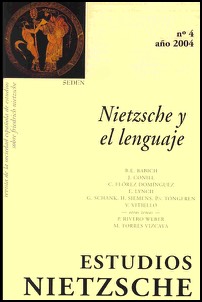«En lucha con el lenguaje». De Wittgenstein a Nietzsche
DOI:
https://doi.org/10.24310/EstudiosNIETen.vi4.9143Abstract
El autor aborda la tarea de demostrar que, a pesar de tantas reivindicaciones, la filosofía del siglo XX no se atrevió a llevar a cabo aquello que hicieron las artes con el lenguaje, es decir, no terminó de tomarse en serio la cuestión del lenguaje. Analiza esto en el ejemplo paradigmático de uno de sus más conspicuos representantes, Wittgenstein. Por contra, esta carencia e incongruencia sí las hallamos superadas, aunque con ciertas aporías, en Nietzsche: el único que puede servir por tanto, hoy en día, para llevar a cabo esa revolución del lenguaje que las artes ya iniciaron hace ahora casi un siglo.
Downloads
Metrics
References
W. Goethe, Faust, trad. it. F. Fortini, 2 vols, Mondadori, Milano, 1980.
G.W.F. Hegel, Enzyklopädie der philosophschen Wissenschaft, en Werke in zwanzig Bänden, Suhrkamp, Frankfurt/M., 1969
G.W.F. Hegel, Phänomenologie des Geistes, Meiner, Hamburg, 1952.
M. Heidegger, Phänomenologische Interpretationen zu Aristoteles, en Dilthey-Jahrbuch, VI, 1989, pp. 236-269.
M. Heidegger, Nietzsche, 2 vols., Neske, Pfullingen, 1961, vol. II.
M. Heidegger, Erläuterungen zu Hölderlins Dichtung, Klostermann, Frankfurt/M., 1971.
M. Heidegger, Sein und Zeit, Niemeyer, Tübingen, 14 1977.
E. Husserl, Logische Untersuchungen I: Ausdruck und Bedeutung, Meiner, Hamburg, 1965.
E. Husserl, Erfahrung und Urteil. Untersuchungen zur Genealogie der Logik, Klaassen, Hamburg, 1948.
Kant, Kritik der reinen Vernunft, en Werke. Akademie Textausgabe, W. de Gruyter, Berlin, 1968.
A. Kojève ‘corrige’ introduciendo, entre paréntesis, «seulement» después de «non pas», cf. Introduction à la lecture de Hegel, Gallimard, Paris, 1947.
C. Di Martino, «Significato e linguaggio nel primo Heidegger», en C. Sini (ed.), Semiotica ed Ermeneutica, Quaderni di Acme 60, Istituto Editoriane Unversitario, Milano, 2003, pp. 125-174.
F. Nietzsche, Nachgelassene Fragmente 1885-1887, KSA XII 7[60]; correspondiente a WM, Kröner, Stuttgart, 1980
R. M. Rilke: «Wozu Dichter?», en Holzwege, Klostermann, Frankfurt/M., 1972,
F. Volpi, «L’esistenza come praxis. Le radici aristoteliche della terminologia di Essere e tempo», en G. Vattimo, G. (ed), Filosofia ’91, Laterza, Roma-Bari, 1992, pp. 215-252.
L. Wittgenstein, Tractatus logico-philosophicus, Vorwort.
Downloads
Published
How to Cite
Issue
Section
License
As of issue 21 (2021) this journal is published only in open access (diamond route).
From that number 21, like the previous numbers published in NIETZSCHE STUDIES, they are subject to the Creative Commons Acknowledgment-NoComercia-ShareIgual 4.0 license, the full text of which can be consulted at <http://creativecommons.org/licenses/by-nc-sa/4.0 >
It is the responsibility of the authors to obtain the necessary permissions of the images that are subject to copyright.
This work is licensed under a Creative Commons Attribution-NonCommercial-ShareAlike 4.0 International License.
Copyright generates two different rights: moral rights and patrimonial rights that EJFB recognizes and respects. Moral rights are those relating to the recognition of the authorship. They are rights of a personal nature that are perpetual, inalienable, unseizable and imprescriptible as consequence of the indivisible union of the author and his/her work.
Patrimonial rights are those that can be derived from the reproduction, distribution, adaptation or communication of the work, among others.







11.png)
